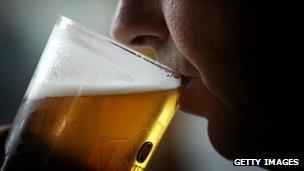Study aims to cut binge drinking by text
- Published

The study will focus on those who consume more than eight units during a drinking session
A study aimed at cutting binge drinking by Scottish men will use text messaging in an attempt to change behaviour.
Researchers at the University of Dundee are set to recruit 700 men aged between 25 and 44 for the study.
They hope to target those who have settled into a pattern of binge drinking, consuming more than eight units of alcohol per drinking session.
Participants will receive regular texts for three months, followed by a phone interview to check their behaviour.
The team behind the research are recruiting men from across Tayside, Fife, the Forth Valley and Greater Glasgow for the study.
The project, funded by the National Institute for Health Research Public Health Research (NIHR PHR) Programme, follows a successful feasibility study carried out in Tayside.
Prof Iain Crombie, of the Centre for Biomedical Sciences and Public Health at the University of Dundee, said: "We are hoping to work with men who have settled into a drinking pattern where they will have consumed more than eight units of alcohol on two occasions in the previous month.
"The basic idea is not to preach to them or tell them what they do. Many alcohol interventions are very 'in your face' and we don't see that as the way to go."
Prof Crombie said the aim of the study was to encourage participants to think about what they were drinking, why they did it and how it fitted in with the rest of their lives.
He added: "Text messaging is an attractive medium to use to deliver those messages. There is evidence that it can be effective, and our study will robustly test that.
"We are also dealing with a group of men who generally do not attend GPs or other healthcare points particularly often, so being able to reach them in this way may be more appealing to them."
'Drinking culture'
Men who join the study will receive regular text messages for three months, following which there will be a phone interview to assess whether there has been any immediate change in behaviour.
They will be asked again after a further nine months whether there has been any longer-term change in behaviour.
Letters of invitation to join the study will be sent out from GP practices while the study team will also be going out into the community to recruit volunteers.
Prof Crombie said new ways of approaching Scotland's well documented alcohol problems were needed.
"There have been many initiatives over decades aimed at changing our drinking culture but it still persists to a large degree.
"As new technology becomes widely adopted we must see if we can use it to come up with better ways of working with people."
- Published25 July 2013
- Published15 February 2013